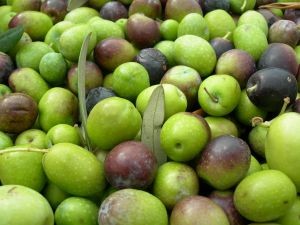 The description of the techniques used in molenda is of great complexity. We can say that in any case the old millstones, or metal (mills), and extracting the oil through the presses, encourage oxidation of the product due to the long contact with the air (it should be recalled that sufficient 105 minutes in order to develop the oxidative processes in the olive paste, while a normal extraction via mills and presses employs a minimum of 3 hours to reach the end). Today you prefer other extraction processes, reduced contact with the air, as the Sinolea, adopted in the mill where we frangiamo olives, providing better product quality and lower its oxidation.
The description of the techniques used in molenda is of great complexity. We can say that in any case the old millstones, or metal (mills), and extracting the oil through the presses, encourage oxidation of the product due to the long contact with the air (it should be recalled that sufficient 105 minutes in order to develop the oxidative processes in the olive paste, while a normal extraction via mills and presses employs a minimum of 3 hours to reach the end). Today you prefer other extraction processes, reduced contact with the air, as the Sinolea, adopted in the mill where we frangiamo olives, providing better product quality and lower its oxidation.
The extraction process adopted by Sinolea consists of several stages: first, the olives are washed and stripped of leaves may be present. So are crushed by steel hammers in containers, also of steel, hermetically sealed, so as to avoid contact with the air (as possible) and the evaporation of the volatile substances. Subsequently, the ends in the kneading the olive paste, which consists of a closed container in which a worm screw rotates continuously the mass, in order to favor the union of the small drops of oil, which become larger and larger, in order to facilitate the water separation. Lastly, the dough comes to Sinolea true, where the steel blades, turning, continuously penetrate into the dough itself and for the different viscosity grade of oil compared to water, the first remains attached on the blades themselves, when they are extracted ; immediately after the oil is scraped away by another blade and collected in a container.
The Sinolea then uses a simple physical principle-mechanic for the cold extraction of the oil, without introducing any chemical element in the whole process.
The remaining dough is then automatically sent to the hydraulic presses hermetic, that press upon extracting the residual oil. The pressure generates an increase of the temperature of the paste which, in any case, never exceeds 27 ° C. It should be remembered that just beyond the 39- 41 ° C there is a major loss of many vitamins thermolabile present in extra virgin, as well as an almost total destruction of the ethers and esters present.
The oil extracted through hydraulic presses, normally is picked by hand, because more dense, aromatic and full of small particles of fruit compared to the first, which is more aristocratic, fine and elegant.
The second oil will produce in time deposits greater than the first, but it will keep even longer smells and tastes of the native fruit.
The whole process takes on average about 30 minutes while using the classical system (grinding stone or steel, and presses with pressure fiscoli) it takes at least three hours, with all the risks that result from oxidation.
There are also problems of hygiene important: in the case of the classical system fiscoli (plastic discs which are used to separate the paste and facilitate the pressure of the press) should be washed every molenda, which rarely happens. So the oil that remains deposited remains there for days, sending dirt and bad tastes also molenda next. If a match of healthy olives follows a less healthy olives, many of the bad smells and tastes of the second are transmitted to the first through straining, as well as through the other parts of the machine such as, for example, the grinding wheel crusher.
All these problems are solved by the systems of extraction equipment, such as the Sinolea, because after each milling machine is washed, comprehensively and quickly.
